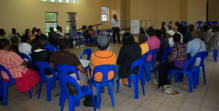
Participants discuss the issues raised in the group work
March 19, 2010 – The second community conversation to promote social cohesion was held in Diepsloot on March 16, 2010. This follows on a conversation held in the same informal settlement on February 25, 2010.
The conversation was attended by members of the community, representatives from local non-governmental organisations (NGOs), community development workers, community policing forums, political parties and trade union representatives. A group of students from the Wits University Civil Engineering Department, which runs a programme in the community in “merging engineering with people”, also attended.
Councillor Ndlanzi from Ward 95 welcomed all present and urged them to embrace the social cohesion programme in Diepsloot. He reminded the community that the programme addresses the core values and principles of Ubuntu – the common humanity and dignity of all people, irrespective of their gender, religion, class or nationality.
Reflecting on his personal life and history of migration into South Africa, he told delegates that his grandmother was married to a man from Malawi. Pointing out that migration is a reality across the globe, he challenged the community by asking, “Should I now denounce him as my grandfather?”
He asked those present to reflect on the aims of institutions such as the Southern African Development Community (SADC) and the African Union (AU) and recognise the mutual responsibilities of all states and peoples to assist each other in times of need. He closed by saying that if he does not have food in his house, his brother next door should provide him with food and protection, irrespective of where he comes from.
Mr Mmatli Senyane, from the Migration Help Desk of the City of Johannesburg, outlined the services provided by the city. These include providing documentation for South African and migrant communities.
Bea Abrahams, the NMF Implementing Partner, gave a summary of the issues that were raised in the previous conversation. These were: a culture of silence and impunity; mistrust of and lack of leadership; lack of participation by migrants; lack of youth participation and a need for economic empowerment. The delegates were then divided into groups to look deeper into the potential causes of the five issues raised.
Following their work in the break-away sessions, groups emphasised community members’ complicity in corruption and the responsibility of community members to stamp out corruption. In remaining silent when crimes are committed, receiving stolen goods, or enabling violence against migrants, the community contributes to the culture of silence that shrouds criminality and violence. Participants spoke of the need to involve youth in community activities and to ensure youth representation on various community structures. They pointed out that in order to undo the perception of corruption within the criminal justice system, individuals and the community needed to speak out on and report corruption. They undertook to launch a public campaign in June, Youth Month, to use community activities to raise awareness about the need for individual and community responsibility in breaking the silence around corruption and crime.
Participants also reminded themselves of their power in ensuring that they elect competent, responsive and accountable leaders, who will work alongside them to keep them informed of the challenges and successes in their community struggles. They urged community members to develop and communicate clear criteria, including the values and competencies they expect of their leadership. Among others, they felt that an effective community leadership structure should enable: greater decentralisation of resources to stimulate economic activity at community level; the identification and development of co-operatives to initiate joint projects and greater skills-sharing, especially between host and migrant communities and the promotion of sustainable community-driven activities that will lead to self-sufficiency.
Participants identified poor town planning and the lack of designated business development sites in Diepsloot as factors contributing to competition and tensions between local and migrant business owners. They acknowledged that there is a general lack of awareness about policies and laws relating to refugees, asylum seekers and other categories of migrants. To promote the protection of migrants’ rights and eliminate the discriminatory practices they are subjected to, non-government organisations and government agencies, such as the City of Joburg’s Migrant Help Desk, must embark on programmes to raise awareness about the rights and responsibilities of migrants, including their right to participate in economic development activities in Diepsloot.
After outlining the potential causes of the issues affecting the community, it was decided that more effort should be made to include members of the migrant community in community activities and structures, such as the emerging Business Forum. Various NGOs, working in Diepsloot, also offered to be in contact with migrant groups that use their services to ensure greater migrant participation at the next Diepsloot community conversation to be held on April 15, 2010.